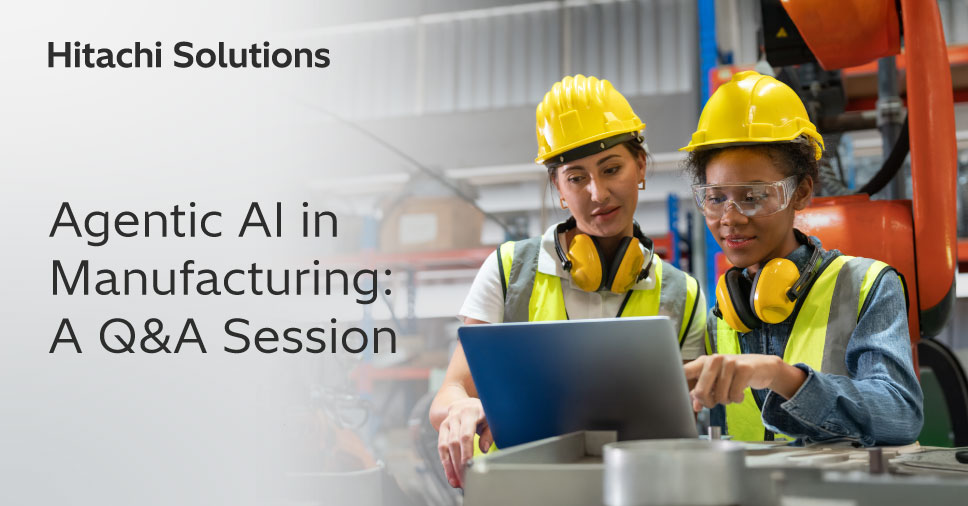

According to the Manufacturing Leadership Council, Manufacturers are gearing up to spend more on AI next year, with 78% of them expected to increase their spending. And it’s not just about jumping on the tech bandwagon.
AI isn’t the shiny new object anymore. It’s the norm. And the next game-changer is Agentic AI, a more advanced breed of AI that’s set to bring more outcomes and AI use cases for manufacturers.
Agentic AI refers to a form of artificial intelligence that can operate autonomously, meaning it can make decisions and take actions without constant human intervention. Unlike traditional AI systems that focus mainly on task automation, agentic AI can adapt to changing environments, learn from new data, and orchestrate complex processes.
Key Features of Agentic AI:
- Autonomy & Decision Making: It can independently manage tasks and workflows, reducing the need for human oversight and making informed decisions based on a wide range of inputs and conditions.
- Learning Capability: Agentic AI can learn from data and experiences, improving its performance over time.
Contextual Understanding: It excels in understanding the context of tasks and scenarios, providing more relevant and accurate insights.
I recently had the opportunity to share the stage with fellow industry insiders to explore agentic AI. I was joined by Michael Mendoza, Industry Director for Manufacturing and Field Service at Hitachi Solutions and Sugan Narayanan, a Business Applications Leader at Microsoft. We had a great conversation, and I wanted to share some of the topics, questions, and answers from our panel of experts.
1. Start with Business Outcomes
Q: Why is it crucial to focus on business outcomes when implementing AI?
Focusing on clear business outcomes ensures that AI initiatives drive real value rather than becoming mere science projects. By starting small with specific use cases that can yield measurable results, organizations can build confidence in AI’s capabilities and gradually scale their efforts. This strategic approach minimizes risks and maximizes the impact of AI on operational efficiency and profitability.
Sugan Narayanan, Microsoft
2. Establish Robust Governance
Q: What governance measures are necessary for AI deployment?
Governance is key to managing AI responsibly. With tools like Microsoft’s Copilot Control System, we can ensure compliance and monitor AI activities to prevent misuse and data breaches. Establishing clear guidelines and oversight mechanisms not only protects sensitive data but also fosters trust among stakeholders, paving the way for broader AI adoption within the enterprise.
Michael Mendoza, Hitachi Solutions
3. Build a Solid Data Foundation
Q: Why is data so critical for AI success?
Data is foundational to AI. Without accurate and relevant data, even the best AI models can’t deliver meaningful insights. Investing in a robust data infrastructure is non-negotiable, as it enables AI systems to learn effectively, make precise predictions, and drive informed decision-making. Ensuring data quality and accessibility is essential for unlocking AI’s transformative potential in manufacturing.
Sugan Narayanan, Microsoft
4. Partner with the Right Expertise
Q: How can partnering with experts enhance AI implementation?
Partnering with AI and manufacturing professionals brings invaluable expertise. They tailor AI solutions to meet specific industry needs, ensuring effectiveness and scalability. Experienced partners can help navigate complexities, avoid common pitfalls, and leverage best practices, facilitating a smoother and more successful AI integration process.
Michael Mendoza, Hitachi Solutions
5. Focus on Contextual Intelligence
Q: How does contextual intelligence differ from traditional automation?
Contextual intelligence goes beyond task automation by enabling AI to understand and adapt to different scenarios, making more informed decisions and providing deeper insights. Unlike deterministic workflows, contextual AI systems can respond dynamically to changing conditions, enhancing flexibility and responsiveness in manufacturing processes.
Joel Lindstrom, Hitachi Solutions
6. Keep Humans in the Loop
Q: Why is it important to keep humans involved in AI processes?
AI should augment human capabilities, not replace them. Keeping humans in the loop ensures oversight and control, allowing for the nuanced decision-making that AI alone can’t provide. By integrating AI as a collaborative partner, organizations can enhance productivity while maintaining the critical human element that drives innovation and strategic thinking.
Sugan Narayanan, Microsoft
For those interested in exploring agentic AI further, Hitachi Solutions offers an AI adoption assessment to help organizations better understand AI-enabled tools, how you can best leverage them for your organization and work with your team to align goals and set a path for adoption.
Additionally, ongoing advisory services and webinars are available to support leaders as they advance their AI strategies. Watch the full webinar on demand here on how agentic AI is revolutionizing the manufacturing landscape and stay tuned for our next installment in this blog series on recent use cases of how manufacturing organizations have been leaning into AI tools for business success.


